Five collections by doo-wop groups on the influential Coed Records label will be released by Omnivore Recordings. The titles include The Rivieras (The Coed Singles), The Duprees (with two separate volumes, The Coed Singles and The Coed Albums: You Belong to Me/Have You Heard), The Crests (The Best of the Crests featuring Johnny Mastro: 16 Fabulous Hits), and Adam Wade (The Coed Albums: And Then Came Adam/Adam and Evening). All five will be available on CD and Digital.
Street dates for the Rivieras and the Duprees’ The Coed Singles is July 24, 2020; street date for the Crests is July 31; and the Duprees’ The Coed Albums and Adam Wade on August 7. Based in New York’s legendary Brill Building — home to pop and Tin Pan Alley songwriters and labels through the 1950s and ’60s — Coed Records was the fledgling venture of ex-big bandleader George Paxton and business partner Marvin Cane. The two founders were more into Glenn Miller than doo-wop, but they hired a stable of R&B-savvy
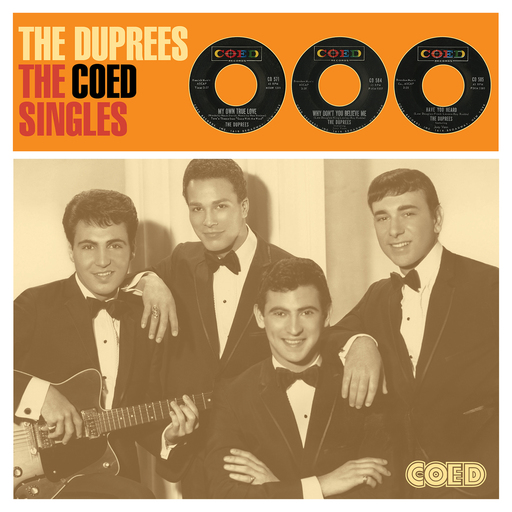
songwriters. And as the youngsters who dominated the record-buying public stocked up on Paul Anka, Frankie Avalon, and Ricky Nelson platters, Coed nurtured vocal groups who could handle the classic pop standards of a bygone era, yet update those chestnuts enough to appeal to a new generation of listeners. Among the label’s biggest hits were the Crests’ “16 Candles” and the Duprees’ “You Belong to Me” and “Why Don’t You Believe Me,” all included in Omnivore’s reissues. Coed thrived from its inception in 1958 until 1965. One of its most famous employees was promotion man Jerry Moss, a future founder of A&M Records with Herb Alpert.
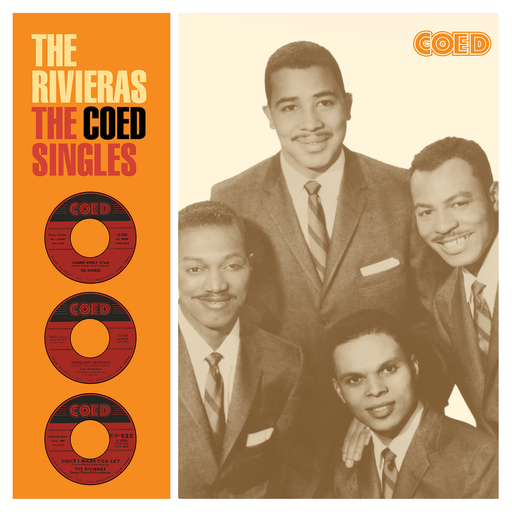
The Rivieras: The Coed Singles
With precise vocal harmonies and meaningful lyrics, the Rivieras grew out of late ’50s, R&B/doo-wop ensembles; they ran through the names Five Bob-O-Links, the Four Arts, and El Rivieras before settling on the Rivieras. Purveyors of classic New Jersey doo-wop in the ballad style, they made their mark covering tunes that had been made famous by big bandleaders such as Ray Anthonyand Glenn Miller. Omnivore is proud to present all of their Coed singles, plus two bonus tracks, amounting to all the released output by the group.
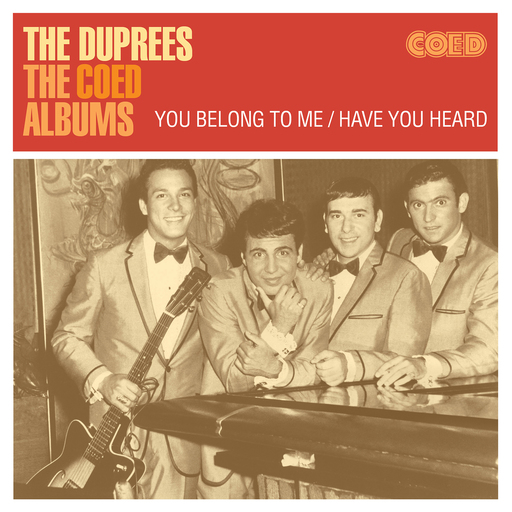
The Duprees: The Coed Albums: You Belong To Me/Have You HeardSigned to Coed in 1962 from a demo tape, the Duprees — some of them still teenagers upon signing — combined the sounds of big band orchestrations with harmony-heavy vocals. Their remake of the Jo Staffordhit “You Belong to Me” was a #7 hit in the summer of 1962. It was their Coed debut. They landed their second single, “My Own True Love” (a song widely known as “Tara’s Theme” from the film Gone With the Wind), at #13. The chart hits kept coming through the fall of 1964, when lead vocalist Joey Vann departed in an attempt at a solo career. (Coed issued his debut single.) Though the group carried on, signing to Columbia and Heritage, their heyday was at Coed. The Coed Singles features all the Duprees’ A- & B-sides for the label, while their two LPs are collected on The Coed Albums.
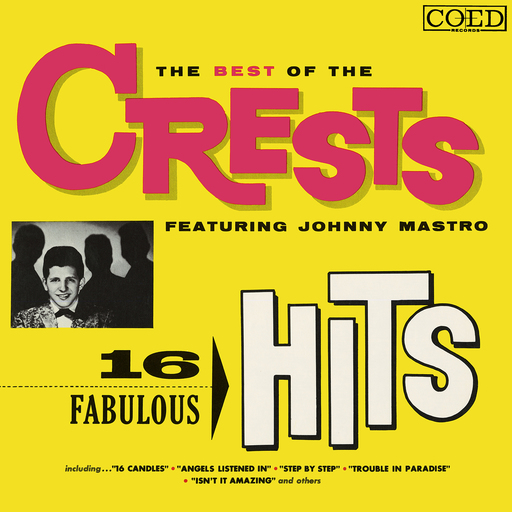
The Crests: The Best of the Crests featuring Johnny Mastro: 16 Fabulous HitsThough there were other integrated ’50s vocal groups, the Crests demonstrated that musical and racial harmony went hand in hand. From the liner notes by Bill Dahl: “Several integrated 1950s vocal groups preceded them, notably the Meadowlarks and Del-Vikings, but this young quartet from the lower East Side of Manhattan took the concept to the ultimate. Powerhouse lead singer John Mastrangelow (shortened to Mastro and then Maestro), born May 7, 1939 and of Italian-American ancestry, was joined by African American first tenor Talmadge “Tommy” Gough and bass singer J.T. Carter and second tenor Harold “Chico” Torres, who was of Puerto Rican descent. They found heavenly unity by crooning sweet doo-wop.” The Crests, discovered singing in the subway, signed to Joyce Records.
Their debut single, “Sweetest One,” charted nationally. At the time, they had another member in Patricia Vandross (Luther’s sister). Unfortunately, Joyce Records was didn’t last long, but one of the writers for Joyce introduced the group to Coed, where they became the first signing for the label. Patricia was also out post-Joyce as her mother didn’t want her out on the road. It only took a couple of single releases to get to “16 Candles,” the eternal classic doo-wop ballad. Starting out as the B-side to “Beside You,” it hit #2 on the pop charts and #4 on the R&B in early 1959. Johnny Maestro gives Alan Freed the credit for flipping the single to “16 Candles.” Dick Clark featured it on American Bandstand, pushing it even further.
More hits followed, but none topped “16 Candles” and by the next year Coed decided that Johnny should be recorded as a solo artist. The Best of the Crests Featuring Johnny Mastro: 16 Fabulous Hits was released to summarize the group’s tenure at Coed. Johnny Maestro (his post-Crests stage name) continued on as a solo artist and eventually fronted the Brooklyn Bridge, heard on their 1969 #3 hit, “Worst That Can Happen.”
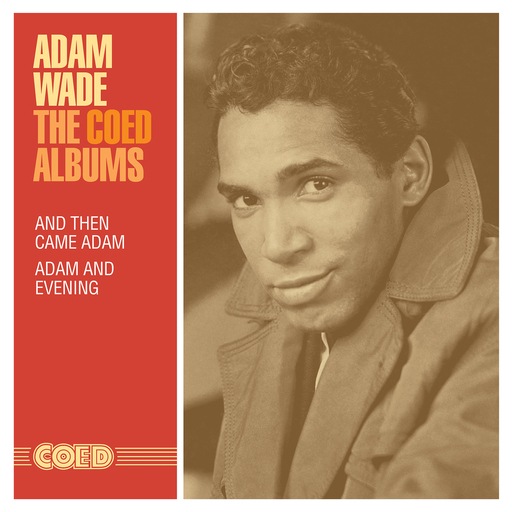
Adam Wade: The Coed Albums: And Then Came Adam/Adam and EveningNot many singers went directly from being on the team of the world’s top polio vaccine researchers to making a string of hit records. In fact, there’s only one: Adam Wade. Blessed with a fine-tuned set of pipes tailor-made for sustained pop success, Wade scored his first hit for Coed in late 1959 and developed into one of the label’s top stars. From his debut album, And Then Came Adam, Wade sent two songs up the charts. “Tell Her for Me” made it to #66, and “Ruby” fared a little better at #58. His follow up album, Adam and Evening, saw the song “Gloria’s Theme” check in at #74. Though his single releases fared far better than album cuts, Wade’s albums were lush affairs with ornate arrangements and harmony-laden choruses courtesy of the Bel-Aire Singers. Unfortunately for Wade, toward the end of 1961, his most successful year, the principals at Coed dissolved their partnership, necessitating a label switch by the singer. The interruption blunted any momentum that Coed had been building for him. He moved over to Epic, but only hit the charts once more in 1965. Though he continued recording for other labels throughout his career, Wade found more success on television, in film, and on the stage, appearing on the small screen in shows ranging from network soap operas to Sanford & Son, The Jeffersons, Good Times, and It’s Happening!!, and on the silver screen in classics such as Shaft and Across 110th Street. In 1975, Wade made television history as the first African-American game-show host, on Musical Chairs.
As the original liner notes from Adam and Evening state, “Adam Wade possesses a truly beautiful voice together with a brilliant style of quiet elegance,” and Omnivore is proud to present the albums where a lifetime in show business began. Remastered by Grammy®-winning engineer, Michael Graves, Wades’ first two albums have never sounded better. New liner notes from author Bill Dahl complete the package.


